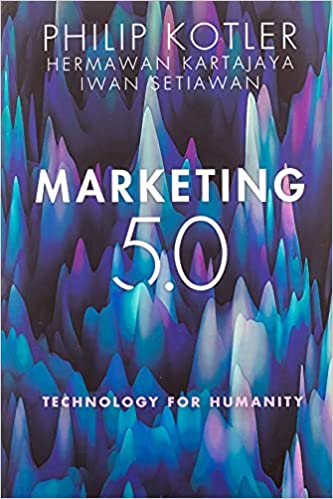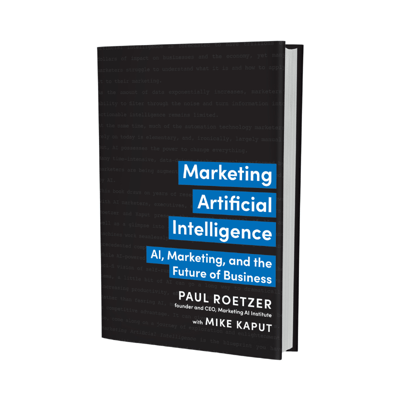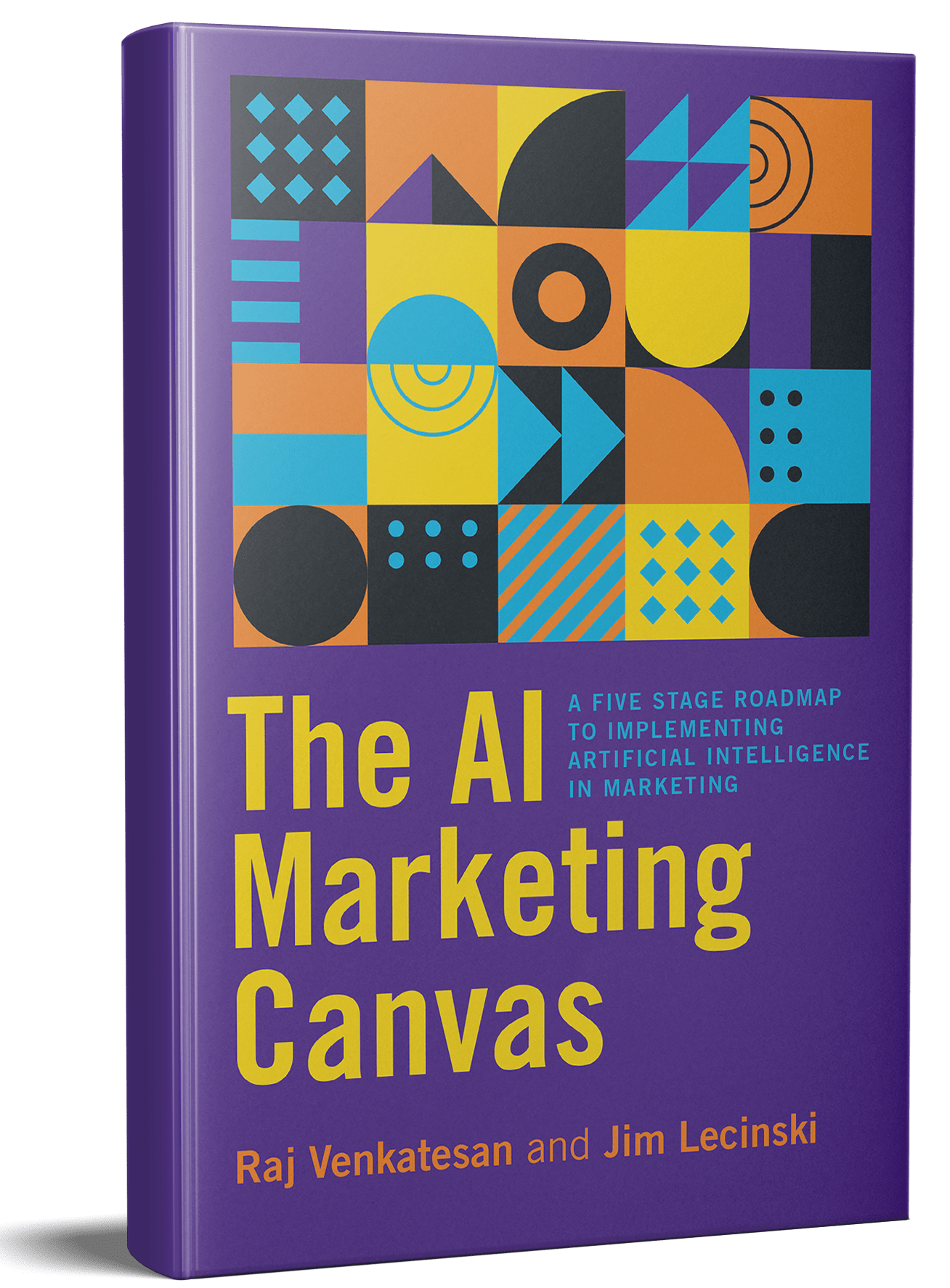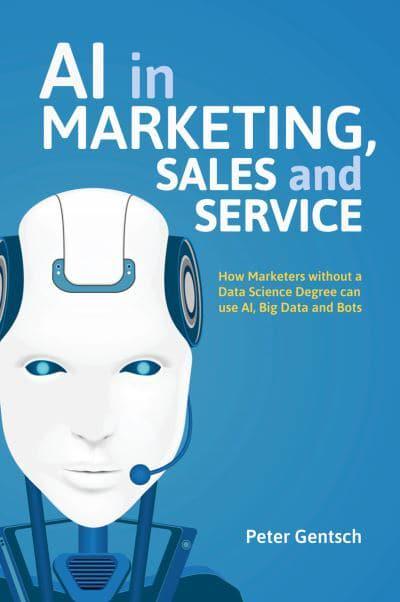AI can be scary. Not in a sci-fi, robot revolution way. But in a "how quickly it's grown", and "the steep learning curve you need to compete with as a marketer".
In fact, 48% of marketing leaders say AI is making the most significant difference in how customers interact with them. So, it's no longer a "nice to have", but a necessity.
So, it's time to learn from the people in the know. The people who have written the literal book on the topic. The people you need to turn to when the AI rabbit hole goes too deep.
That's why we've compiled a list of the best book on AI marketing you need to read, right now. It says so, right in the title.
The Top 7 AI Marketing Books To Read in 2023
Marketing 5.0: Technology for Humanity by Philip Kotler
"Marketing 5.0 Technology for Humanity" is a book co-authored by Philip Kotler, known as the father of modern marketing, along with Hermawan Kartajaya and Iwan Setiawan.
 This book presents a marketing strategy tailored to the digital landscape, urging all of us to embrace change.
This book presents a marketing strategy tailored to the digital landscape, urging all of us to embrace change.
Marketing 5.0 represents a collaborative strategy where technology and humans work together to create customer experiences that are essential to their lives. It is the "Experience Economy" era.
While technology is important, Marketing 5.0 emphasises the centrality of humanity. It applies human-mimicking technology to create, communicate, deliver, and enhance value throughout the customer journey.
Key concepts of Marketing 5.0 include data-driven marketing, predictive marketing, contextual marketing, augmented marketing, and agile marketing.
Next Tech is a critical theme in Marketing 5.0, comprising technologies like AI, NLP, robotics, AR, VR, IoT, and blockchain, which aim to emulate human marketers' capabilities.
In Marketing 5.0, marketers play a pivotal role in achieving successful applications by maintaining a balanced symbiosis between humans and technology. It's about finding ways for machines and people to deliver the most value throughout the customer journey.
Technology provides several benefits to marketing, including accessing big data, predicting outcomes, creating highly contextual experiences, increasing productivity, and enabling quicker and leaner marketing delivery. However, embracing a transformative mindset focused on data-driven and agile approaches is crucial for the successful implementation of technology in marketing.
Digital Darwinism by Tom Goodwin
"There are a lot of companies that need to get excited about technology. They need to embrace it and think of it in a much more profound and existential way" Tom Goodwin told us in our book club podcast, after the launch of Digital Darwinism's first edition.
In a way, not much has changed. But everything has changed. Tom is still the quintessential digital disrupter, but he is back with an entirely revised new edition of Digital Darwinism.
Tom himself has admitted that his book was borne out of a fair amount of anger and frustration. While he acknowledges that not every company is "screwed" by technology or needs to change, he wants less caution and more excitement about what it can offer.
But it's not all bad news. In fact, the book offers a sense of optimism about the future.
"Digital Darwinism can be a threatening concept, but Tom Goodwin's advice is refreshingly optimistic: don't wait for the perfect moment - embrace change before you have to, change often, focus on possibilities rather than threats and act with common sense and urgency. Whether you're building a start-up or transforming an established legacy brand, you'll find value in Goodwin's perspective."
―Jeff Dailey, CEO, Farmers Insurance
Digital Darwinism guides its reader through the unrelenting pace of change and uncertainty we see in the industry today. Due to the clashing and collaboration of the real and digital worlds, we're seeing a hybrid space that is expected to work perfectly and seamlessly but often doesn't.
Digital Darwinism isn't all about the strongest, fittest, wealthiest business. Nor the one with the strongest, most jacked C-suite.
It is basically all about being active and proficient in immediately adjusting to the changing global marketplace. Companies can stay competitive by being active, and by putting innovation and a willingness to change at the forefront of their strategy.
This can also be aided by a company looking away from accepted parameters and towards new approaches.
So, what are three lessons the reader can take away from this book? Well:
- Avoid the Heathrow Airport business model. Heathrow is in an area which makes it difficult to manoeuvre planes. It would have made sense for them to move to a new location. however, they have spent time and money, lots of time and money, trying to make a failing idea work. Many businesses continue to fall into this trap.
- The traditional definition of disruption is wrong. According to Harvard Business School academician, Clayton Christensen, disruption in the business world occurs when a new company comes with new tech and offers a lower cost of service that the older companies cannot compete with. Tom disagrees. He suggests that new business models like Uber and Airbnb do not offer lower prices, just better customer service and experience.
- Digital integration needs more than lip service. Disrupting your industry doesn't mean you have to be a new business. You can do it in four ways; self-disruption, continual reinvention, measured bets, and hedge bets.
But is one book not enough? Want more for Tom Goodwin? Well, have we got the course for you. Tom has collated all his cracking digital futurist knowledge into a one-stop shop, AKA our Digital Transformation course. Click here to find out more!
Marketing Artificial Intelligence: AI, Marketing, and the Future of Business by Paul Roetzer
Artificial intelligence (AI) is projected to have a profound impact on businesses and the economy, with trillions of dollars at stake. However, many marketers face challenges in comprehending its nature and implementing it effectively in their marketing strategies.
The reality is that AI possesses transformative capabilities.
Although AI-powered marketing technologies may not reach the level of self-running, self-improving autonomous systems depicted in science fiction, even a small infusion of AI can yield significant improvements in productivity, efficiency, and performance.
autonomous systems depicted in science fiction, even a small infusion of AI can yield significant improvements in productivity, efficiency, and performance.
In "Marketing Artificial Intelligence," Paul Roetzer, Founder & CEO of the Marketing AI Institute, and Mike Kaput, Chief Content Officer, collaborate to demonstrate how marketers can embrace AI and leverage it as a competitive advantage.
Drawing upon extensive research and numerous interviews with AI marketers, executives, engineers, and entrepreneurs, Roetzer and Kaput explore the current potential of AI while providing a glimpse into a future where marketers and machines seamlessly collaborate to execute highly personalized campaigns of unparalleled complexity with remarkable simplicity.
As the volume of data grows exponentially, marketers face limitations in sifting through the noise and transforming information into actionable insights. Roetzer and Kaput guide you in harnessing this challenge, enabling you to turn breaking through the noise into your superpower.
Let's take a moment to delve into the fascinating world of the author, Paul Roetzer. He is not just an ordinary author, but a powerhouse of marketing knowledge and innovation.
Roetzer is the brilliant mind behind PR 20/20 and the esteemed Marketing Artificial Intelligence Institute. He has penned two highly acclaimed books: "The Marketing Performance Blueprint" (Wiley, 2014) and "The Marketing Agency Blueprint" (Wiley, 2012). In his first book, "The Marketing Agency Blueprint," he unveils the secrets of building cutting-edge, tech-savvy agencies that outshine traditional firms in terms of efficiency, influence, and profitability.
But Roetzer's expertise doesn't stop there. He has also created two groundbreaking platforms: the Marketing Artificial Intelligence Conference (MAICON) and the AI Academy for Marketers. These initiatives demonstrate his dedication to making AI approachable and actionable for marketers, while also empowering change agents to drive transformation through the strategic use of marketing talent, technology, and strategy.
With a degree from Ohio University's E.W. Scripps School of Journalism under his belt, Roetzer has left an indelible mark on the marketing world. His consulting expertise has been sought after by countless organizations, ranging from nimble startups to prestigious Fortune 500 companies.
The Modern AI Marketer by Pam Didner
Pam Didner is a multifaceted professional in the realm of B2B marketing. She brings her expertise as a consultant, writer, podcaster, speaker, and author of two influential books: "Global Content Marketing" and "Effective Sales Enablement."
With a focus on sales enablement, account-based marketing, and the integration of sales and marketing within enterprise and technology companies, Pam offers invaluable training, coaching, and strategic guidance.
marketing within enterprise and technology companies, Pam offers invaluable training, coaching, and strategic guidance.
Pam has an extensive international presence, having delivered enlightening presentations and workshops on future trends, content marketing, and sales enablement across the United States, Europe, South America, and Asia.
Her approach is characterized by a strategic mindset coupled with a hands-on approach to implementation.
She's also a frequent speaker at AntiCon in London's Magazine!
But let's jump into the book.
Artificial Intelligence (AI) has seamlessly integrated itself into our lives, becoming an indispensable companion. We rely on these digital companions for various daily tasks, such as delivering our preferred news or podcasts in the morning, assisting in text completion, finding the optimal route to work, offering personalized movie and music recommendations, and much more.
Despite our concerns about AI potentially overpowering humanity, we have grown increasingly comfortable with the presence of intelligent machines in our everyday routines. These intelligent systems have also made a significant impact on business applications and our professional lives.
In her latest book, "The Modern AI Marketer," Didner takes marketers on an enlightening journey. She explores the history of AI, its current applications in modern marketing, and how to drive AI initiatives in the workplace. The book provides valuable resources, including recommended books, podcasts, and blogs, to further expand one's knowledge of AI.
Didner shares numerous use cases that demonstrate how AI can be leveraged as a powerful marketing and sales enablement tool.
The Book caters to marketers and sales professionals directly involved in or supporting the development of marketing strategies, outbound marketing, demand generation, content marketing, account-based marketing, and sales enablement. If you are new to AI and eager to explore its potential as a marketer or sales professional, this book is a must-read.
The AI Marketing Canvas: A Five-Stage Road Map to Implementing Artificial Intelligence in Marketing by Jim Lecinski
This book presents CMOs with a practical and actionable plan that enables them to strategically map out initiatives, ensuring success regardless of their marketing organization's current stage.
The authors raise critical questions for marketers to ponder: Firstly, how should modern marketers approach artificial intelligence and machine learning? Secondly, how can marketers develop a comprehensive strategy and implementation plan for incorporating AI into their marketing toolkit?
The initial chapters provide marketing leaders with a clear understanding of AI and its distinctions from traditional computer science approaches.
Venkatesan and Lecinski introduce a five-stage framework, termed the "AI Marketing Canvas," as a best-practice model for implementation. This framework is the outcome of extensive research and interviews with industry-leading marketers, and it includes numerous real-world examples of how brands are utilizing AI at each stage of the canvas.
To offer guidance, the authors showcase successful brands like Google, Lyft, Ancestry.com, and Coca-Cola, illustrating how these companies have effectively integrated AI into their marketing strategies. The book concludes with a discussion of crucial implications for marketing leaders, focusing on team dynamics and organizational culture.
By providing concrete examples, valuable insights, and a systematic framework, Venkatesan and Lecinski equip CMOs with the tools needed to navigate the realm of AI in marketing and drive meaningful results.
AI in Marketing, Sales and Service: How Marketers Without a Data Science Degree Can Use AI, Big Data and Bots by Peter Gentsch
AI and Algorithmics have already demonstrated their significant impact on production and logistics processes. Now, it is crucial to harness the potential of AI in marketing, sales, and management, spanning various areas like administration, planning, and creative procedures.
This book offers a comprehensive and accessible guide that enables you to evaluate the value and potential of AI and Algorithmics effectively. It systematically integrates the technologies and methodologies of AI, providing practical business scenarios at an entrepreneurial level. The book showcases insightful interviews and compelling case studies featuring innovative companies and executives, shedding light on the following:
The book explores the automatic identification and profiling of customer and market potential. It illustrates how AI can intelligently automate and optimize media planning using AI and Big Data. Additionally, it emphasizes the role of (chat)bots and digital assistants in enhancing communication efficiency and intelligence between companies and consumers. The book also delves into the optimization of Customer Journeys by leveraging Algorithmics and AI. Lastly, it presents more efficient and intelligent approaches to market research.
Inevitably, all businesses will transition to AI-driven operations in the future. This book, authored by Gentsch, acts as a guide, providing valuable insights on how to ensure your business successfully embraces this transformation, ultimately gaining a competitive edge over your rivals.
But want more on AI? Want the down-low from a download? Well, check out our AI-driven growth eBook, here!
